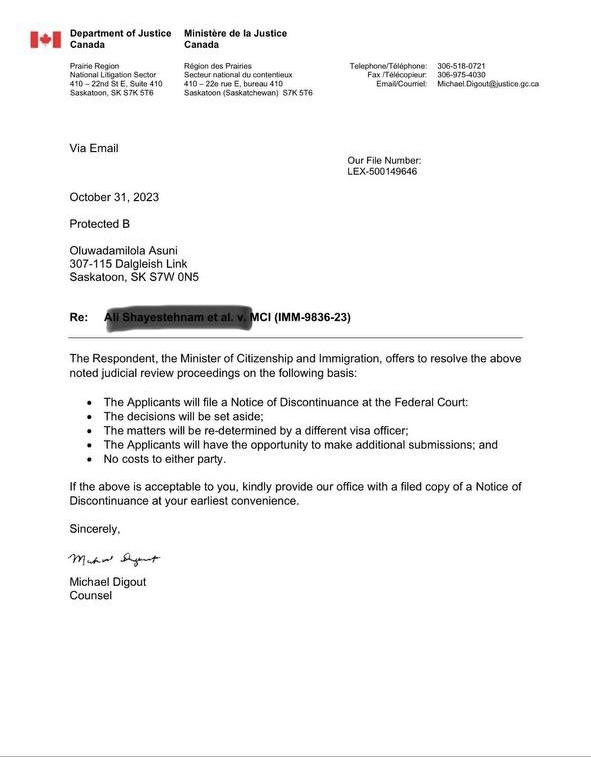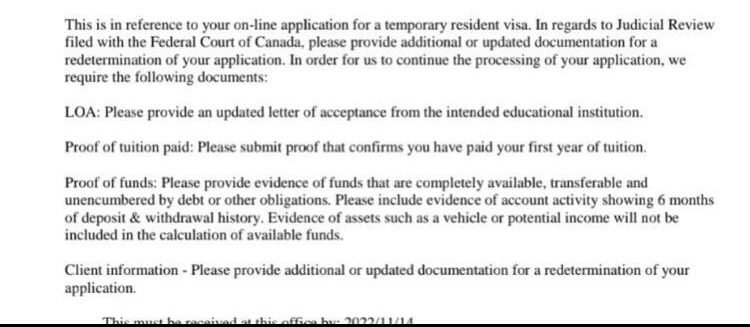Facing a Canada Visa Rejection ? Follow This Step-by-Step Guide to Successfully Appeal
In this article, Crest Attorneys explain how we help you appeal IRCC decisions, including how to effectively prepare documents for a Judicial Review to successfully overturn your visa rejection

Clients' Feedback
Oluwadamilola Asuni
In this article, all your questions regarding the appeal for rejecting the application have been answered. At the end of the article, by filling out the assesment form, the support team of Crest Attorneys will contact you.
Refused by IRCC ? Here is Exactly How to Start Your Appeal
A refusal from IRCC (Immigration, Refugees and Citizenship Canada) can feel discouraging, but it doesn’t have to be the end of your Canadian journey. At Crest Attorneys, we have successfully helped clients secure visas after a refusal.
Our approach is to file for a Judicial Review (JR) in Federal Court — a legal process that challenges IRCC’s decision and asks the court to review whether the refusal was fair and reasonable.
If your application has been refused, we’re here to guide you through the appeal process with clarity and confidence.
📌 Why Choose Judicial Review?
Judicial Review in Federal Court is one of the most effective ways to challenge a wrongful visa refusal. In this process, a judge examines whether the visa officer’s decision was fair and legally justified. If the court rules in your favor, your application will be reconsidered by another visa officer to ensure a fair decision.
Get Free Consultation
By filling out the assessment form, our support team will contact you as soon as possible
Take IRCC to Court !
Judicial Review (JR) is a legal process that allows you to challenge an unfair or unreasonable immigration decision. If your visa or immigration application was refused, and you believe it was not justified, you can ask the Federal Court of Canada to review the decision.
You may be eligible for JR if your case was decided by:
-
IRCC – Immigration, Refugees and Citizenship Canada
-
CBSA – Canada Border Services Agency
-
IAD – Immigration Appeal Division
-
RAD – Refugee Appeal Division
📌 Quick Facts:
-
Used to challenge unfair refusals
-
Applies to most immigration decisions (visitor, study, work, PR)
-
Legal help is highly recommended — deadlines are strict!
Key Deadlines for Judicial Review
-
15 days to apply if you’re inside Canada
-
60 days to apply if you’re outside Canada
-
Missing the deadline may limit your legal options unless a valid reason is accepted by the court
Judicial Review Process
1. You recieve rejection letter from IRCC
After receiving a rejection letter from IRCC, if you are inside Canada, you have a 15-day time limit for initiating the judicial review. If you are outside of Canada, the time limit is 60 days for pursuing this process.
2. Your case will be filed in federal court by lawyer
The first step in a judicial review is to file the Application for Leave and Judicial Review at the registry of the Federal Court.
3. IRCC sends the rejection reasons to the court.
The federal court registry will then request the reasons for the refusal from the decision maker and copies of the reasons will be provided to the applicant and the respondent
4. Your lawyer filed the Memo.
The applicant must submit their application record (which mainly consist of their memorandum of argument, affidavit, and the documents that were submitted in their application to the visa officer etc) to the court registry within 30 days of receiving the reasons for the refusal.
5. The IRCC lawyer may file a memo in response to your lawyer's memo
the respondent may either offer to settle the judicial review or present their own argument to the court. If the respondent offers to settle and if the applicant accepts the settlement offer, a notice of discontinuance will be filed at the registry of the court to discontinue the judicial review.
6. The judge makes a decision
If the respondent rather presents their argument to the court, then the parties have to wait for a Judge to review the arguments and decide whether to grant leave for the judicial review to commence.
Judge Desicion
Stage 7 and stage 8 are where the judge makes a decision about your application, determining whether it can proceed in the process or if your appeal will be dismissed

How to Strengthen Your Canadian TRV Application Amid Rising Canada Visa Rejections
Canada visa rejections have surged in 2024, sparking concerns among international students, temporary workers, and visitors. The Canada visa rejection rate increase highlights the importance of proving one’s intention to return home after a temporary stay. Below,...

10 Reasons for the rejection of Canadian Citizenship Applications
Canada is a primary destination for immigrants, offering a high quality of life and global opportunities. However, the journey to becoming a citizen isn’t without challenges. Many applicants face Canada citizenship rejection due to overlooked requirements or errors....

10 Essential Tips to Maintain Permanent Resident Status in Canada
If you're a permanent resident in Canada, maintaining your status requires ongoing effort and attention. Here are 10 essential tips to help you Maintain Permanent Residency Canada and navigate the complexities of Canadian immigration.If you're a permanent resident in...
7. The judge grants permission to proceed with the appeal in the Federal Court
If leave is granted, a date for oral hearing will be fixed but the option to propose a settlement remains open to the respondent until the oral hearing is held. If an oral hearing is held, the parties have to wait for a decision to be made by the judge.
8 . The judge dismisses the case
the matter will not continue , but you can re-apply again
7. The judge grants permission to proceed with the appeal in the Federal Court
If the judge allows the case to enter the court, sets a time for the hearing: usually between 30 and 90 days after granting the leave.
8 . The judge dismisses the case
Your content goes here. Edit or remove this text inline or in the module Content settings. You can also style every aspect of this content in the module Design settings and even apply custom CSS to this text in the module Advanced settings.
9. Recive settelmnt letter
The settlement, in simple terms, means IRCC accepts its mistake, and the previous decision will be set aside.
between stage 2 to 8 it is possible to receive settlement letter from IRCC
What is a Hearing Session in Federal Court of Canada?
Most of the judicial review cases handled by Crest Attorneys are settled. However, if a judicial review case goes to oral hearing, Crest Attorneys will do its best to represent the client’s interest. If the judicial review is settled or if the oral hearing is successful and a favorable decision is issued by the judge, the decision maker will be required to reopen and redetermine the refused immigration application,
Our Most Recent Hearing Session Success
1: Court Orders Reassessment of Study Permit and TRV Applications (File No: IMM-2064-22)
Unreasonable Decisions Identified
The Court allowed the application for judicial review (File No: IMM-2064-22), concluding that the refusal of the study permit and temporary resident visa (TRV) applications was unreasonable. It found significant errors in the immigration officer’s evaluation of the applicant’s circumstances, including an incorrect representation of the tuition deposit amount and insufficient consideration of evidence demonstrating financial stability and ties to Nigeria.
Lack of Justification and Transparency
The Court emphasized that the immigration officer’s decision lacked the hallmarks of justification, transparency, and intelligibility. Specific shortcomings were highlighted in assessing the applicant’s financial resources, study plan, and economic connections. These failures rendered the decision to deny the applications unjustifiable and unsupported by the evidence.
Reassessment Ordered
As a result, the Court directed that the study permit application be remitted for redetermination. Additionally, since the minor applicant’s TRV application depended on the principal applicant’s study permit, it too was remitted for reconsideration. No questions for certification were raised, and the Court ordered a fresh review of both applications based on the evidence provided.
Read more : https://www.canlii.org/en/ca/fct/doc/2023/2023fc923/2023fc923.html
Court Orders Reconsideration of Study Permit Application (File No: IMM-7857-22)
Unreasonable Decision Identified
The Court granted the application for judicial review (File No: IMM-7857-22), determining that the visa officer’s decision to refuse the study permit application was unreasonable. The Court found significant flaws in the officer’s assessment, including a failure to properly evaluate the applicant’s family ties, financial stability, and study plan. The officer’s conclusion that the study program was redundant lacked justification and failed to consider the evidence presented by the applicant regarding its relevance to her career advancement.
Lack of Consideration for Evidence
The Court emphasized that the officer did not adequately address key evidence provided by the applicant, such as her strong ties to Iran, including extended family members, employment opportunities, and assets in her home country. The officer’s reasoning also failed to properly assess the applicant’s motivation to return to Iran after completing her studies and her detailed explanation of why the chosen study program aligned with her professional goals. This lack of a comprehensive evaluation rendered the decision unjustified and unreasonable.
Reconsideration Ordered
As a result, the Court granted the application for judicial review and ordered that the matter be remitted to a different decision-maker for reconsideration. No questions for certification were raised, and the Court directed the new decision-maker to reassess the application based on the evidence provided and in accordance with the applicable legal principles.
Read more : https://www.canlii.org/en/ca/fct/doc/2023/2023fc1318/2023fc1318.html
Court Orders Redetermination of Work Permit and Visitor Visa Applications (File No: IMM-7810-22)
Procedural Fairness and Reasonableness Issues Identified
The Court granted the application for judicial review (File No: IMM-7810-22), concluding that the decision to refuse the Principal Applicant’s open work permit application and the Minor Applicants’ visitor visa applications was both unreasonable and procedurally unfair. The Court found that the immigration officer relied on extrinsic evidence from the Principal Applicant’s spouse’s study permit application without disclosing this information or providing the Applicants an opportunity to respond, which violated principles of procedural fairness. Additionally, the reliance on this evidence undermined the transparency, justification, and intelligibility of the decision, rendering it unreasonable.
Lack of Proper Assessment of Evidence
The Court emphasized that the officer failed to adequately assess the financial and personal circumstances of the Applicants based on the evidence they provided. The decision instead relied on unverified information about the spouse’s study permit application, including tuition costs and available funds, without allowing the Applicants to contest or address this evidence. The Court noted that procedural fairness requires immigration officers to disclose and allow responses to such extrinsic evidence, particularly when it forms the basis for a negative decision.
Redetermination Ordered
As a result, the Court granted the application for judicial review and ordered the matter to be remitted to a different decision-maker for redetermination. The Further Affidavit submitted by the Applicants was not admitted into evidence. No questions for certification were proposed or identified by the Court. The new decision-maker is directed to reassess the applications in accordance with the principles of fairness and reasonableness, based solely on the evidence provided by the Applicants and any additional disclosures.
Read more :
Click Here for the Final Court Decision (IMM-11221-22)
How Long Does the Judicial Review Process Take?
The Judicial Review process for Canada visa refusals follows multiple steps, each with an approximate timeline. The total duration depends on case complexity, court schedules, and procedural factors, making it difficult to predict an exact timeframe.
📌 Key Stages of the Judicial Review Process:
1️⃣ Application for Leave – The Federal Court assesses whether your case has legal merit before granting a full review (approximately 30 to 90 days). You may receive a settlement letter at this stage, which can resolve the case early. If no settlement is reached, the process continues to the Judicial Review Hearing, making the process longer.
2️⃣ Judicial Review Hearing – If leave is granted, a judge will conduct a hearing to review the refusal decision (approximately 2 to 6 months). A settlement letter may still be issued at this stage, potentially shortening the process.
⏳ Factors Affecting Processing Time:
✔ Complexity of the case and legal arguments
✔ Court scheduling and availability
✔ Response time from the government and IRCC
✔ Possibility of receiving a settlement letter (early resolution)
✔ Additional evidence or procedural delays
At Crest Attorneys, we have successfully handled numerous Judicial Review cases and helped clients navigate the process efficiently. While we cannot guarantee an exact timeframe, you can check the outline of the average timeline for our successful cases.
File Number | Application Type | Start | End | Timeline |
IMM-15669-24 | Visitor Visa | 2024-08-22 | 2024-11-12 | 83 Days |
IMM-7114-24 | Visitor visa | 2024-04-19 | 2024-10-30 | 195 Days |
IMM-16855-24 | Student Visa | 2024-09-11 | 2024-11-12 | 63 Days |
IMM-16993-24 | Visitor Visa | 2024-09-16 | 2024-11-12 | 58 Days |
IMM-11116-24 | Student Visa | 2024-06-24 | 2024-09-27 | 96 Days |
IMM-8929-24 | Visitor Visa | 2024-05-23 | 2024-06-24 | 33 Days |
IMM-10963-24 | Student Visa | 2024-06-24 | 2024-08-27 | 65 Days |
IMM-10187-24 | Visitor Visa | 2024-06-11 | 2024-09-06 | 88 Days |
Settlement Letter
In the above judicial review process diagram, you may get a settlement letter between stages 2-8.
What is a settlement letter in simpler terms?
The IRCC provides you with the opportunity to have your application re-evaluated by different visa officers. During this review, they typically request additional documents, such as a letter of acceptance, bank statements, and client information.
Below is an image of a settlement letter, allowing you to see its contents and understand what is typically included in such a document.
In the below image, you can read three terms in the settlement letter :
1: The decisions will be set aside
2: The matters will be re-determined
3: The applicant will have the opportunity to make additional submissions
4: No costs to either party

What Comes Next After You Receive the Settlement Letter?
After receiving the settlement letter, your application will be sent to the IRCC for review by another officer. During this process, the officer may request additional documents, causing your application status to change from ‘refused’ to ‘action required
IRCC typically asks for the following documents for study permit applications:
- Letter of Acceptance (LOA) for
- Updated bank statement
- 6-month bank statement
- Updated client information
IRCC typically asks for the following documents for visitor visa applications: - updated client information
Below is sample of IRCC letter which sent to one of our client profile

Answers to Your Questions
Could you please advise if an unsuccessful outcome would negatively impact our future visa applications?
An unsuccessful appeal will not negatively impact your future visa applications. You can always submit fresh new applications without any disadvantage.
How does the involvement of a lawyer like Mr. Dami enhance the chances of success in a Judicial review?
Having Mr. Oluwadamilola Asuni ( Dami) , an expert in Judicial review, increases your chances of success. With a proven track record of handling hundreds of cases, his expertise and experience are invaluable assets to your case.
How long does the entire Judicial review process typically take from start to finish?
The judicial review process duration varies, but on average, our clients receive settlement letters within approximately 4 months, though this can differ based on individual circumstances.
What are the potential outcomes of a successful Judicial review for my visa application?
Our experience handling hundreds of judicial review cases demonstrates that after a successful Judicial Review, your chances of obtaining your visa significantly increase.
In what ways can Crest Attorneys provide ongoing support and guidance throughout the judicial review process?
At Crest Attorneys, we offer continuous support and guidance throughout the entire Judicial review process. We keep you informed with regular updates and provide assistance through various channels like WhatsApp and follow-up forms to ensure your peace of mind and confidence in our services.
